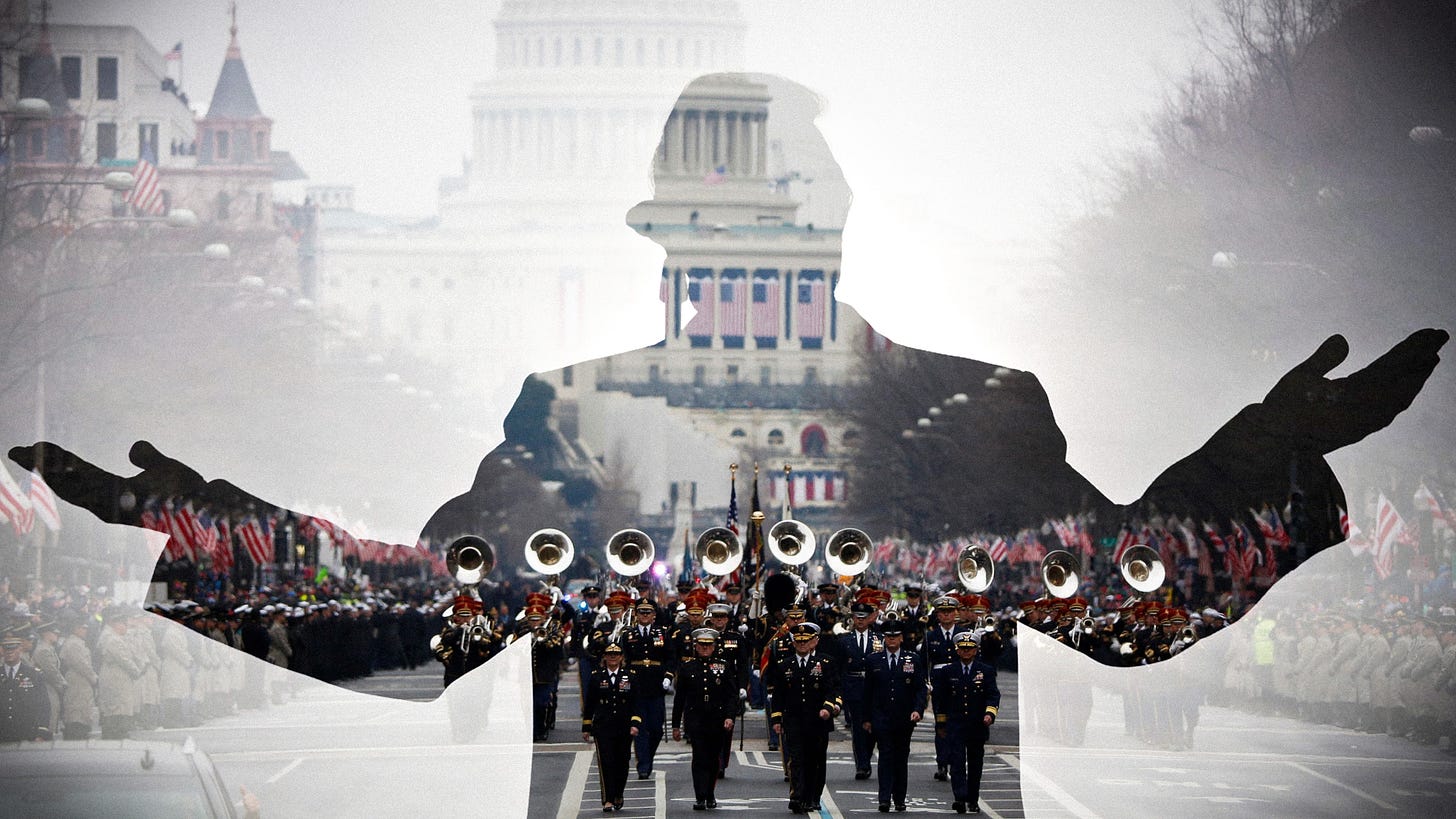Trump’s Birthday Military Parade Destroys the Very Purpose of Our National Rituals
They are meant to get past even bitter disagreements and affirm collective values, not divide and conquer
This reflection was written in advance of Israel’s attack on Iran. To my thoughts below I add prayers for peace and safety to all innocents caught in this conflict.
On July 5, 1852, when Frederick Douglass approached the podium of Corinthian Hall in Rochester, New York, the audience likely expected his denunciation of slavery, the Compromise of 1850, and the recently enacted Fugitive Slave Act. Douglass did not disappoint. He also, however, expanded his remit to address Independence Day itself.
For Douglass, who had a keen understanding of the way rituals encapsulate meaning, the idea of celebrating Independence while America continued to expand and entrench its “peculiar institution” meant that the ritual would endorse an insult to the American project. Slavery was bad enough—but to celebrate America in that moment was, for him, a perversion. He offered the example of the ancient Israelites who flatly refused to celebrate their holidays during their exile in Babylon, saying, “How can we sing the Lord’s song in a strange land?” Better not to celebrate at all.
Douglass quoted Isaiah who, in responding to a people bewildered by God’s abandonment, thundered the divine rationale:
Because on your fast day, you see to your business, and oppress all your laborers! Because you fast in strife and contention, and you strike with a wicked fist! Your fasting today is not such as to make your voice heard on high. ... No, this is the fast I desire: To unlock fetters of wickedness, and untie the cords of the yoke.
This is how Douglass saw that Fourth of July in 1852. He erupted at the ritual corruption of the country he loved: “[Y]our celebration is a sham; your boasted liberty, an unholy license; your national greatness, swelling vanity; your sounds of rejoicing are empty and heartless; your denunciation of tyrants, brass fronted impudence.”
Trump’s ‘Brass Fronted Impudence’
I thought of these words as I listened to President Trump’s Memorial Day remarks at Arlington National Cemetery:
We’re going to have a big, big celebration, as you know, 250 years. In some ways, I’m glad I missed that second term ... because I wouldn’t be your president for that. Most important of all ... we have the World Cup, and we have the Olympics. Can you imagine? I missed that four years, and now look what I have, I have everything. Amazing the way things work out. God did that. I believe that too. God did it.
As he spoke these words, he defiled our national holy of holies, the Tomb of the Unknown Soldier. Even the president’s press office must have felt some degree of disgust, since the full version of the speech, after appearing on the White House website, was later abridged to a curation of “highlights” a few days later.
At least he is telling us, “I have everything.” Thus we learn what we already know: our national celebrations will be tools in the project to glorify a singular leader. What ethos could conflict more directly with the message of our nation’s founding? Yet this is what the upcoming year of 250th celebrations will say: starting June 14, with Trump’s birthday, and the 250th anniversary of the formation of the United States Army, we are about to endure a series of personal ostentations instead of collective celebrations of national meaning. The very rituals which should strengthen and expand our shared purpose will be subverted to constrict the meaning of what will “make America great” and alienate half the country. It will be a gross explosion of “brass fronted impudence.”
The same indignity and rage should burn on our lips as it did for Douglass and Isaiah. Consider the unspoken message that will be sent by the upcoming military parade on Pennsylvania Avenue. No matter what words are spoken, the United States Army, whose core values are “Loyalty, Duty, Respect, Selfless Service, Honor, Integrity, and Personal Courage,” will be used as a prop for Trump’s endless self-aggrandizement.
This critique of Trump’s plans is borne not out of partisan differences with his policies—though there are plenty we could list. The problem is that we need national rituals with integrity. In some sense, the entire endeavor of America depends upon it. In her 2004 book, Talking to Strangers, Danielle Allen explains that, fundamentally, the key to a functioning democracy is the willingness of the losing side to go along with the results of elections. As Allen puts it, “Democratic citizens are by definition empowered only to be disempowered. As a result, democratic citizenship requires rituals to manage the psychological tension that arises from being a nearly powerless sovereign.”
In other words, liberalism promises that each of us, based upon our individual dignity, agrees to abide by the governing system. But the experience of electoral loss, along with whatever policy impacts that will cause, violates our sense of agency. And as those impacts, or the perception of those impacts, escalates, the “psychological tension” mounts. We need an emotional and spiritual way to vent that frustration constructively, to heal the wound in our sense of belonging to the national whole.
Rituals as Psychic Balm
Enter rituals. They provide legitimacy, express deeper values, and remind the community of what binds us together. They elevate us beyond the immediate policy or political conflicts of the day to remember the transcendent values undergirding the American endeavor. They make the losses of a single election bearable because our “true creed,” as Martin Luther King Jr. put it, remains intact. They help us maintain hope that even our worst national mistakes can be overcome and we can, in the words of Langston Hughes, “Let America be America again.”
Rituals can do this because they are vast and complicated. They communicate overlapping and even contradicting layers of meaning. Often, through art, architecture, music, garb, choreography, tradition, poetry, and, in the case of religion, theology, the combined aesthetics are more powerful than any speech or public statement. Because of their artistic complexity, they mirror the messiness of our humanity, and thus rituals address our individual and collective identities. In their ambiguities, they invite multiple interpretations and broad arrays of meanings. Thus they can unify, uplift, and even heal us, which is why after national tragedies, sanctuaries everywhere are full. In my lobby hangs a picture of my sanctuary following the 2018 Pittsburgh Synagogue Shooting. Turbans and hijabs appear amongst heads clad in kippot. Everyone needed a ritual to make sense of the moment.
This is yet another reason why Jan. 6, 2021 so badly damaged the country. While the attempt to change the outcome of the election was absurd, the attackers succeeded in destroying the possibility of ritual healing. The logic of democracy—which, by definition, would allow any candidate, including theirs, to lose—was the enemy. So the attack, as haphazard and disordered as it appeared, was actually quite surgical. In their nihilism they trampled the very procedures which would restore a shared sense of meaning.
They felt little shame—indeed they celebrated the moment—because the idea of ritual itself has lost its value. Our official holidays are mattress sales and barbeques. Our most universally celebrated moment is Super Bowl Sunday, which is a national fiesta of advertisements, celebrity halftime shows, and violent athleticism. That is our shared ritual. Trump can grandstand in our national holy of holies on Memorial Day because nobody cares. His remarks received a shrug.
Military Parades Are Indeed for Authoritarians
Looking ahead, we should expect a similar diffidence, or even arguments rationalizing away the corruption of our national rituals. Referring to the June 14 birthday celebration, Kori Schake argues, “Surely the nation can bear up under a military parade once every decade or two.” Her thesis is that the public should ignore Trump’s relentless grandstanding and focus on the positive that may come out of the tanks tearing up Washington, D.C. streets, namely, countering misperceptions about the armed forces and reminding the country and others of the good they can do. Whatever one thinks of that rationale, it ignores the parade’s real objective: the solidification of Trump’s grip on our national identity.
The damage this would cause to the social weal is frighteningly real. While the moment may be less violent than Jan. 6, it will be equally an attack on a ritual that sustains our covenant. Whether we like it or not, this year of 250th celebrations will be the loudest statement of our values in a generation. We already know how the government-sponsored rituals will look. Trump just told us. “I have it all.”
If we do nothing, the damage will be tremendous. Douglass taught us: ritual subversion is part of a vicious cycle corroding the spiritual center of a people. We forget who we are and therefore care little when our rituals rot, which further eats away at our shared identity. So this year, we will be fasting “in strife and contention.” Our special days will become “hollow mockery” of all we hold dear. By going along with the celebration, or even just looking the other way, we will abet the emptying and repurposing of our national values and institutions.
Drown Out Trump’s Parade on America’s 250th With Joyous Celebrations
I am not satisfied to wait this out or to cry gevalt. I also do not want to take a knee and protest what should be a shared celebration. Instead, I propose we forge an alternative to a year of Trump250. I say let the politicians do what they want and let Trump and his circle go deaf with the sounds of their own parades. Meanwhile, America is a big place, one built block by block, town by town, county by commonwealth. In every neighborhood we can decide how we celebrate our country’s founding in the year ahead. We need not sit back and let whatever spectacle is created on the National Mall become our national message.
Rather, we can write our own civic liturgy and create our own celebrations. Fortunately, we have millions of local institutions in this country with buildings able to host. We have an entire profession of clergy trained in how to create and conduct rituals. We have a thick, overlapping quilt of religious traditions which, if we are true to them, stoke the republican virtues upon which our democracy depends. We have vast networks of personal relationships between clergy who live in local communities. We need not wait to see what will come out of the White House next summer.
This July 4, a group of rabbis and I are launching something we call “faith250.” We call upon colleagues and institutions of all faiths to get busy creating an alternative to what we know lies ahead. We will spend a year in fellowship exploring the meaning of America in our lives and souls. While President Trump exults, “I have it all,” we will flood the zone with the values upon which our democracy is based.
We have no policy agenda or party loyalty. We do not seek even to bridge our divides. Rather, we will create for next July 4 tens or hundreds or thousands of celebrations to rediscover and reestablish the national values for which our ritual is meant to stand.
© The UnPopulist, 2025
Follow us on Bluesky, Threads, YouTube, TikTok, Facebook, Instagram, and X.
We welcome your reactions and replies. Please adhere to our comments policy.










Thanks for the text. It feels crazy that Trump is "improting" ideas from Russia regarding military parades.
We the people of the United States will be having a shared ritual on June 14th: our Constitutionally-given right to freedom of assembly.
Millions of us are going to march in hundreds of cities to protest what the country has become. Will you be there?